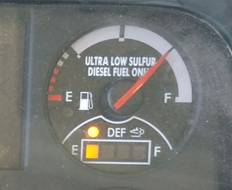DEF-Diesel Exhaust Fluid Explained
Recently while doing the pre-trip on a mobile clinic with a diesel engine I noticed something I have never seen before, an empty DEF fluid gauge. Unfortunately the drivers I was training had no idea what DEF fluid was or why it’s important, hence this explanation.
What is diesel exhaust fluid?
DEF,  is an elixir that’s necessary to make sure that what exits a diesel vehicle’s tailpipe is as sweet as an Alpine breeze. The DEF fluid gauge is usually beneath the fuel gauge and in this case, shows 0. When full it would show four green bars.
is an elixir that’s necessary to make sure that what exits a diesel vehicle’s tailpipe is as sweet as an Alpine breeze. The DEF fluid gauge is usually beneath the fuel gauge and in this case, shows 0. When full it would show four green bars.
DEF, is a fluid consisting of urea and deionized water in a 1:2 solution. It’s contained in a reservoir separate from the fuel tank and is metered into the engine’s exhaust stream to control certain emissions. Inside the exhaust pipe, the DEF vaporizes and decomposes into ammonia and carbon dioxide. Those two compounds then react with oxygen and detrimental nitrogen oxides inside the vehicle’s selective catalytic reduction (SCR) catalyst. This produces three benign tailpipe gases: nitrogen, water vapor, and carbon dioxide.
What happens if you run out of diesel exhaust fluid?
Diesel exhaust fluid is used to reduce NOx emissions. You will get a lot of warnings to refill the DEF tank before you run out. If you decide to ignore the warnings or the circumstances do not allow tank refill, the engine is designed to limit its power and fueling dramatically. This is a form of punishment to the driver if you like, but also it is a way of mitigating and controlling the increase of NOx emissions due to the lack of fluid.
Is it bad if I ingested DEF?
Drinking it should be avoided at all costs. If that happens, contact a doctor immediately. Also, refer to any warnings that may be present on the jug or package (if applicable).
What happens if DEF goes into my eyes?
If it gets into your eyes, flush with large amounts of water immediately for at least 15 minutes. Consult a doctor if you have any doubts or symptoms that are concerning.
What happens if I spill DEF, how do I clean it up? DEF residue can be easily cleaned up by washing the area with warm water.
Is DEF fluid corrosive?
It is corrosive to most metals used in automotive applications. Carbon steels, iron, zinc, nickel, copper, aluminum and magnesium are some of them. If it comes into contact with any metals, you should clean the area with plenty of warm water to eliminate accelerated corrosion.
Can DEF go bad?
The fluid typically has a shelf life of 18 months. It does not expire technically, but it can lose its water content and the ratio of Urea/Water could change. This will affect engine emissions, since all the calculations in the ECU expect urea to be 32.5% of the DEF solution injected.
How can I check the DEF quality?
Its quality can be easily checked using a urea refractometer (available at Amazon.com). What happens if DEF freezes? How can you keep DEF from freezing? 67.5% of DEF is water. DEF freezes at -11 C or 12.2 F. When DEF thaws and goes back to liquid form, it maintains it consistency. It is suggested that you store DEF at a temperature between 5°C and 25°C (23°F and 77°F).
How do I store DEF?
Store in sealed containers to avoid contamination and avoid direct sunlight to prevent water evaporation. How long can you store DEF? Is there a shelf life? It can be stored for 18 months at a temperature between 5°C and 25°C (23°F and 77°F). For every 5° (9°F) above the recommended temperature, shelf life is reduced by six months.
Is DEF fluid all the same?
All DEF fluids that are supposed to be used in automotive applications should meet ISO 222411-1 specifications. Assuming that all Diesel Exhaust Fluids meet the ISO specifications, they should all be the same.